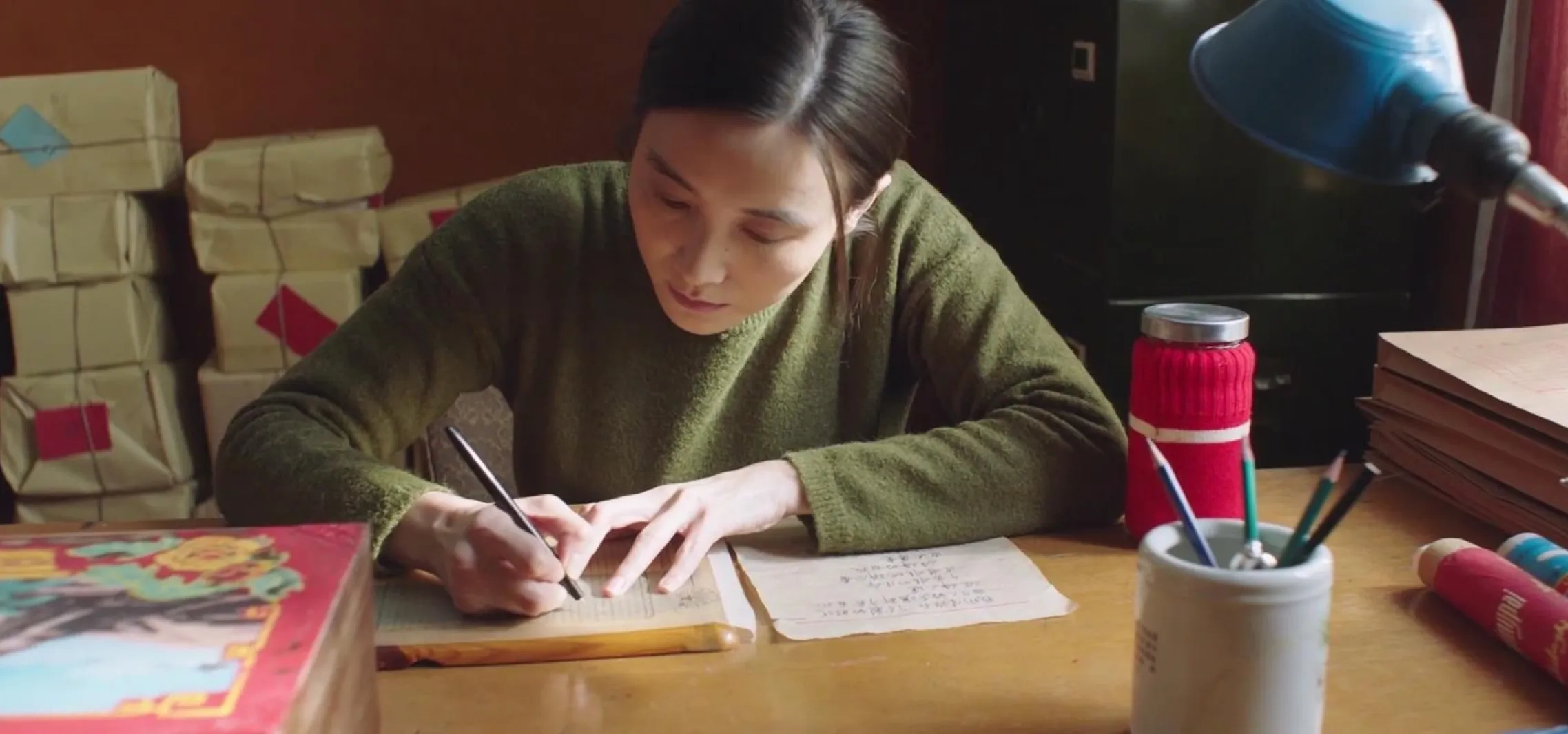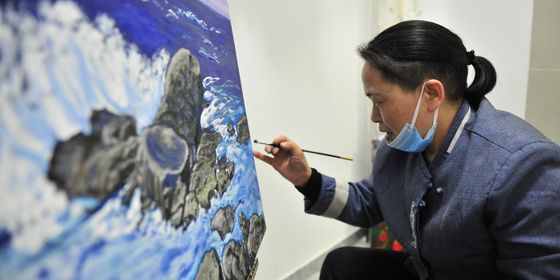On a seedy street in a small town, a 50-year-old woman struggles to chase her literary dreams as she makes a living by cutting hair
1 / 7
She never even finished elementary school, but she fell in love with reading and writing all the same. In reality, given her current skill level, some might only call her a literary enthusiast, but the other literary enthusiasts in this city all like to call her a writer, and she thinks of herself as one too.
The first time I saw her was in 2010. At the beginning of that summer, I had come to work at a factory that made down jackets, converted from the former offices of the county’s Bureau of Civil Affairs. I lived in the old office of the bureau chief. Young couples often came knocking on my door, asking where they could get a marriage certificate, and I would give them directions to the bureau’s new location.
There was a bustling vegetable market outside our factory, and I liked to stand outside the entrance and take it all in. One middle-aged woman stood out: She was tall and thin, built almost like Eileen Chang. She was always wearing ankle-length floral skirts or cheongsams. Other women would mind their children or hold hands with their husbands, but she was always alone, quiet, walking along in a leisurely fashion. She didn’t haggle with the vendors, and as soon as she finished her shopping she would leave calmly, without another word.
I later learned that she ran a hair salon on Donghong Avenue. I often passed her store when I went for walks. The salon was old and run-down, and she was the only person working there. With less than 20 square meters of space, the shop was divided into a front and back room. The cramped back room held a small folding table and a small computer desk. At one end of the desk, there was a bookshelf against the wall, with a few dozen books on it. This book collection is what drew my attention. Whenever I passed her shop, I would swivel my head to see what she was doing. The salon didn’t have many customers, and nearly every time I passed by, she would be typing away at the computer.
At the beginning of 2011, I bought a small apartment inside an old grain depot on Donghong Avenue. Since I often worked away from home, I rented it out, and didn’t move in until the end of 2017. In my spare time, I liked to go for strolls on the street outside my building. The road was clean and broad, six lanes to a side, with towering plane trees growing along it. Many little shops flourished in the shade of those trees, selling fresh flowers, tea, fish, and poultry.
I heard an old lady say that several decades ago, Donghong Avenue was nothing like this. Back then, it was a pitted two-lane gravel road. There were many hair salons on either side of the road with signs advertising haircuts, but their actual business was shadier—“They were all fronts [for prostitution], bait and switch!” Many of these shops only opened in the evening, when dim red light streamed through their windows and pretty young women sat by the door and greeted passing men, tossing flirtatious glances their way. If a man smiled back, old or young, they would stand, pull them into the store, and the clothes would start coming off.
One of these salons is still around, located under the big bridge at the east end of the avenue. Two middle-aged women in heavy makeup sit inside. Occasionally, a migrant worker from one of the construction sites will patronize the shop. The shop owned by the woman who liked to read was also still in business. When I passed by on my walks and turned to look, the woman would be typing away at her computer, just as before. I wanted to go in and ask if she was writing, but I was too embarrassed—her little shop had a small bed in it, which made me wonder if she engaged in side business of her own. I couldn’t work up the courage to go in.
One afternoon, I was browsing blogs when I happened upon a short story. The story’s author was a woman who owned a hair salon, and her shop was across from a grain depot. One day, a grain smuggler came to sell his haul, carrying his ill-gotten gains in a cloth sack. Fearing that someone would steal it, he came into the shop, hid the bag under the little bed, and asked the woman to keep watch for him. After the smuggler left, she lay on the bed and stared at the sack underneath it, desperately wanting to take it so she could leave the shop behind. She thought of how the divorce court told her she had no home, no money, and no job, so her husband would get custody of her son. If she took the money, she could use it to get her son back. After a long internal battle, she resisted the urge to steal.
After reading this story, I suspected that the author might be the woman I often saw on my walks. I kept reading into the night, making my way through the entire archives of the blog. One of the stories was a good length, with a decent plot, so I decided to go over and have a chat. I thought I’d see if she wanted to contribute to a column.
Her shop was only a few dozen meters away, so I arrived in no time. I talked with her for a while, learning that she had already been writing for over 10 years, but had only made a few yuan in writer’s fees. She hadn’t been able to publish most of the manuscripts she submitted. Some were published in local papers, but she never earned a single cent for those. She told me she was grateful just to be published—getting paid was beyond her wildest dreams.
She had also self-published a collection of essays, spending 20,000 yuan to print a thousand copies. She had gone around selling them wherever she could; her “literary friends” from WeChat bought some, and she gave some away. There was a Beijing journalist from our city, who after seeing her collection was moved by the challenge of doing creative work in poverty. The journalist tried to donate 3,000 yuan to encourage her to continue writing, but she wouldn’t take it.
By the time I came to visit her, she still had over half of the books left. I paid 40 yuan for a copy. When I flipped through it that night, I found that I had already read the majority of it on her blog. Some of the stories were excellent, realistic and touching. The rest were passages from daily life, which she had recorded like journal entries. Most of it was in the local dialect, earthy enough to leave crumbs. Many of the characters were incorrect; an outsider wouldn’t have been able to make heads or tails of it. For example: zhuabakuan, “a paw’s width,” should’ve been zhabakuan, “a span’s width.” Or datiaogua, which is a term in dialect rarely used among the local youth nowadays, gave me pause for a few seconds before I realized it meant “naked.”
She recorded each day’s happenings on her blog, including my own visit: “The shop isn’t big, but this space the size of a postage stamp is a meeting place for people from all walks of life. I thought I’d long grown accustomed to this parade of humanity, but today I was surprised to meet one of my breed. His love for reading and writing moved me. It was still oppressively hot when night fell. I was in the shop, sweeping up trimmings, when I looked up to see a tall, strong-nosed young man standing in my doorway. He had thick brows and big eyes…”














